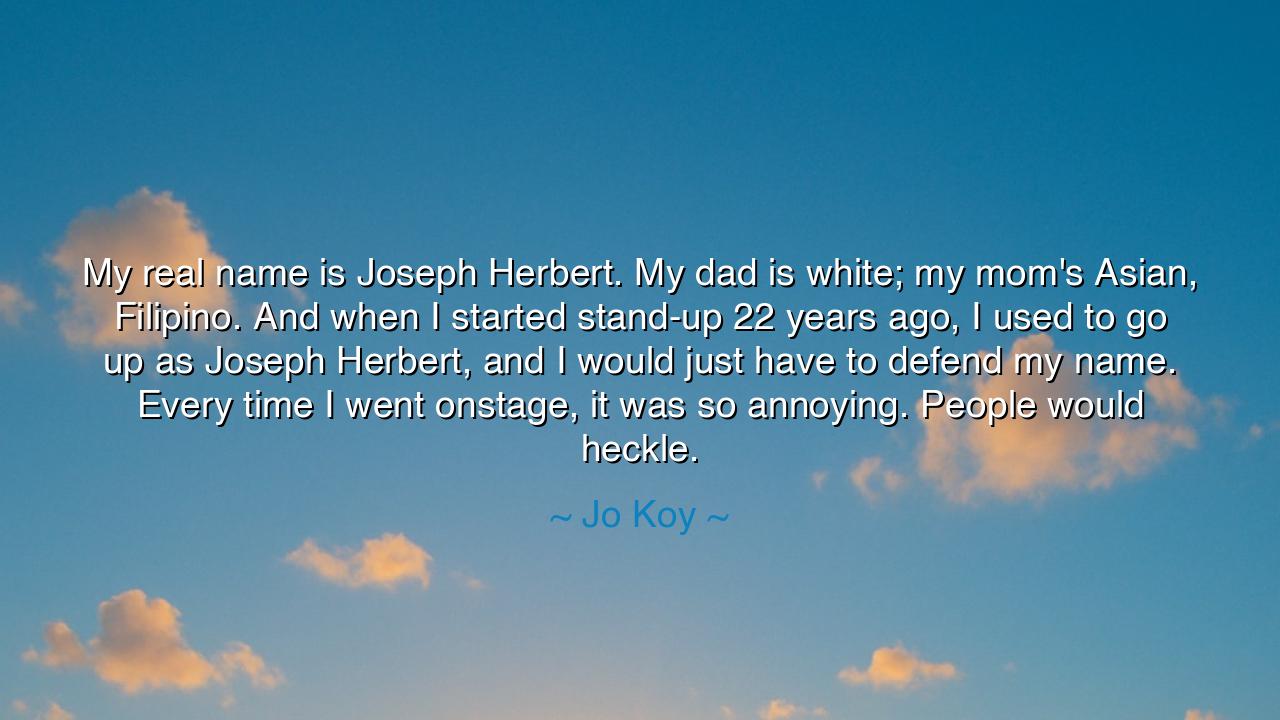
My real name is Joseph Herbert. My dad is white; my mom's Asian
My real name is Joseph Herbert. My dad is white; my mom's Asian, Filipino. And when I started stand-up 22 years ago, I used to go up as Joseph Herbert, and I would just have to defend my name. Every time I went onstage, it was so annoying. People would heckle.






In the words of Jo Koy, the laughter of truth hides behind a veil of struggle: “My real name is Joseph Herbert. My dad is white; my mom’s Asian, Filipino. And when I started stand-up 22 years ago, I used to go up as Joseph Herbert, and I would just have to defend my name. Every time I went onstage, it was so annoying. People would heckle.” Within these words lies not merely a story of a man and his name, but the eternal story of identity — the battle between the soul that knows itself and the world that does not yet see. It is the cry of every spirit that dares to rise while wearing the garments of two worlds. Jo Koy’s voice, echoing through time, becomes a mirror for all who are torn between belonging and authenticity.
Long ago, in the days when names were sacred symbols, to name oneself was to declare one’s essence to the universe. The name was not a sound — it was a covenant, a mark of ancestry and destiny. Yet in the modern age, names have become burdens to those whose sounds do not fit the tongues of the many. When Joseph Herbert stepped upon the stage, his name — plain to some, strange to others — became a test of his strength. Before he could speak his art, he had to fight for his right to be heard. And thus, his first audience was not laughter but judgment. Still, like a warrior tested by fire, he endured.
Consider the tale of Frederick Douglass, born a slave, named by masters who wished to strip him of personhood. When he fled bondage, he chose a new name, one that he would fill with power. “Douglass” became not a mere surname but a banner of dignity and self-made freedom. Likewise, Jo Koy would one day forge his own name from “Joseph Herbert,” shaping a stage identity that the world could both remember and respect. Both men understood a truth that time cannot erase: to name oneself is to reclaim the divine right of creation.
There is a moment in every soul’s journey when it must decide — whether to shrink beneath misunderstanding or to rise above it. Jo Koy chose the latter. He turned mockery into humor, and through humor, he transformed pain into light. The same name that drew laughter from cruelty began to draw laughter from joy. This is the alchemy of the artist — to transmute rejection into recognition, to make beauty from bruises. His story teaches that one’s difference, once despised, can become one’s greatest gift.
And what of those who stand today in his shadow — the young, the unheard, the unseen? They too bear names that sound foreign to the world’s ears. They too must face the storm of misunderstanding. Let them remember that every heritage is a treasure, every accent a song. The world mocks what it does not yet understand, but understanding always follows those who endure. For identity is not a costume to be worn for acceptance; it is the armor of truth.
The ancients would say: when a man defends his name, he defends the spirit of his ancestors. When he speaks with courage, he redeems their silence. The laughter that Jo Koy earns today is not only for his jokes — it is for his victory, for every child who will one day bear their name without apology. The heckles he once faced have become applause, proof that time bends toward those who stay true to their voice.
So, what lesson must the listener carry from this tale? Do not flee from your name, your roots, or your truth, no matter how the crowd reacts. Stand firm in the light of who you are. Let your craft, your courage, and your kindness speak for you until the world learns to pronounce your worth. When the stage of life calls, do not shrink your story to fit another’s comfort. Instead, proclaim it proudly, for it is written in your blood and echoed in your soul.
And thus, the teaching closes: the world may jeer at first, but it will bow in time. Authenticity, like a river, wears down the stones of prejudice. Be patient, be steadfast, and one day your name — whatever it may be — shall be known not as strange, but as sacred.






AAdministratorAdministrator
Welcome, honored guests. Please leave a comment, we will respond soon